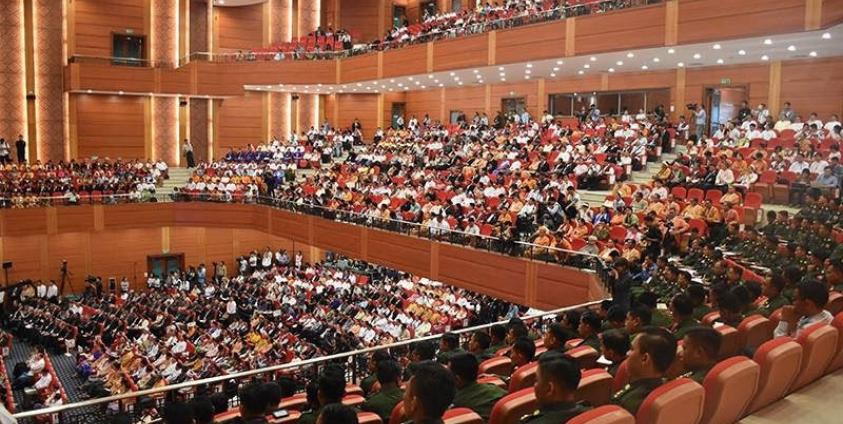Peace talks between Myanmar's government and warring ethnic minorities started today in a bid to end decades of conflict that have claimed thousands of lives and kept the country mired in poverty.
A sea of colour filled the vast conference hall in the capital Naypyidaw as delegations from Myanmar's myriad ethnic groups mingled with stony-faced military officers decked out in full regalia.
The summit is veteran democracy activist Suu Kyi's much-trumpeted effort to reshape Myanmar as a federal democracy following decades of oppressive military rule.
The Nobel laureate has made bridging the ethnic fault lines that have fractured the nation since its mid-century independence a priority of her new government, which took power in March.
"So long as we are unable to achieve national reconciliation and national unity, we will never be able to establish a sustainable and durable peaceful union," she told delegates.
"Only if we are all united will our country be at peace. Only if our country is at peace will we be able to stand on an equal footing with the other countries in our region and across the world."
Speaking at the opening, the Secretary-General of the United Nations, Ban Ki-moon,said in the following address,
“This is a historic occasion for the further democratization of this country.
The symbolism of this Conference is clear from its title, which recalls the spirit of the original Panglong Conference convened in 1947 by General Aung San, the Father of Modern Burma.
But today, we also look to the future.
This conference is bringing together Myanmar’s different ethnic groups in a joint commitment to a federal union based on equality, democracy and self-determination.
I congratulate all sides for the patience, endurance, determination and spirit of compromise you have demonstrated in support of national reconciliation.
There is a long road ahead, but the path is very promising.
This is the first time that such a peace process has been initiated in the seventy-year history of conflict and division between the Union Government and armed ethnic groups.
Today’s meeting marks a historic transition since former President U Thein Sein opened the doors to democratic reforms six years ago.
Around the world, we have seen the tragedies that can ensue when leaders deny the need for democratic change.
Myanmar shows what is possible, when leaders listen to their people’s genuine aspirations, genuine concerns of the people and genuine dreams of where this country should proceed.
The United Nations has been a steady partner in support of Myanmar’s reforms, in particular the national reconciliation process.
We will continue our efforts to smooth differences, lower tensions and move parties towards better understanding and dialogue in line with the goals and values of the United Nations Charter.
The long civil war has cost numerous lives and robbed successive generations of their dignity, tranquillity and normalcy. It is now clear that there can be no military solution to your differences.
I urge you to accept that no party involved in this reconciliation process can expect to achieve all its aims. Conversely, every side must win something if the process is to succeed.
This will require goodwill on all sides, and a recognition that success is in the vital interest of all the people of Myanmar, regardless of ethnicity, religion, political affiliation or socio-economic status.
It is encouraging that the different ethnic armed organizations with divergent interests and aspirations came together to form a single team to negotiate the Nationwide Ceasefire Agreement last year.
This agreement was crucially important, and the new Government has undertaken efforts to make it more inclusive. The 21st Century Panglong Conference represents the result of those efforts.
I urge all of you, as you walk along this path with Daw Aung San Suu Kyi, to demonstrate the wisdom needed to address complex and unresolved issues, and to pave the way for a unified negotiation track that is inclusive of all interests and constituencies.
This will require sensitivity and flexibility, and respect for both signatories and non-signatories. You will need to be truly consultative if you are to reach sustainable solutions. In this connection, I urge you again to ensure that women make up at least 30 per cent of the representatives at all levels of dialogue.
Every transition [carries] risks.
But refusing to embark on transition may carry the greatest risk of all. We see tragic evidence of this around the world.
I urge you all to continue to face up to your responsibilities, particularly to the youth and children of Myanmar – the future of this wonderful country.
You owe it to them to work for a better tomorrow, in which they can fulfil their dreams and aspirations in peace and prosperity.”
Few expect a concrete deal to emerge from the five-day talks, which are seen as the start of a peace process that could take years.
Seventeen rebel groups have joined the talks in the capital, but others have not laid down their arms and some remain locked in combat with the military.
(Additional reporting AFP)








